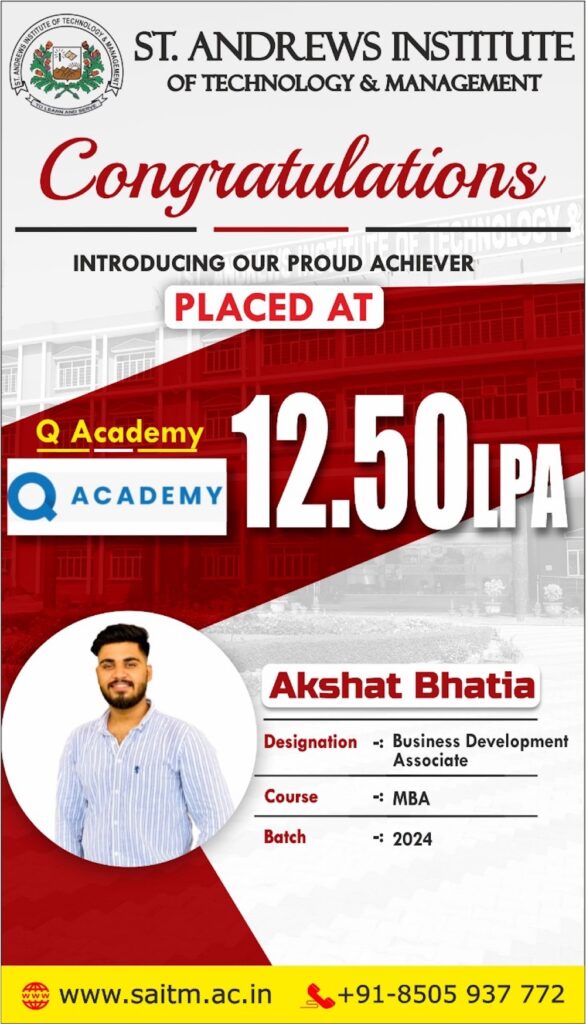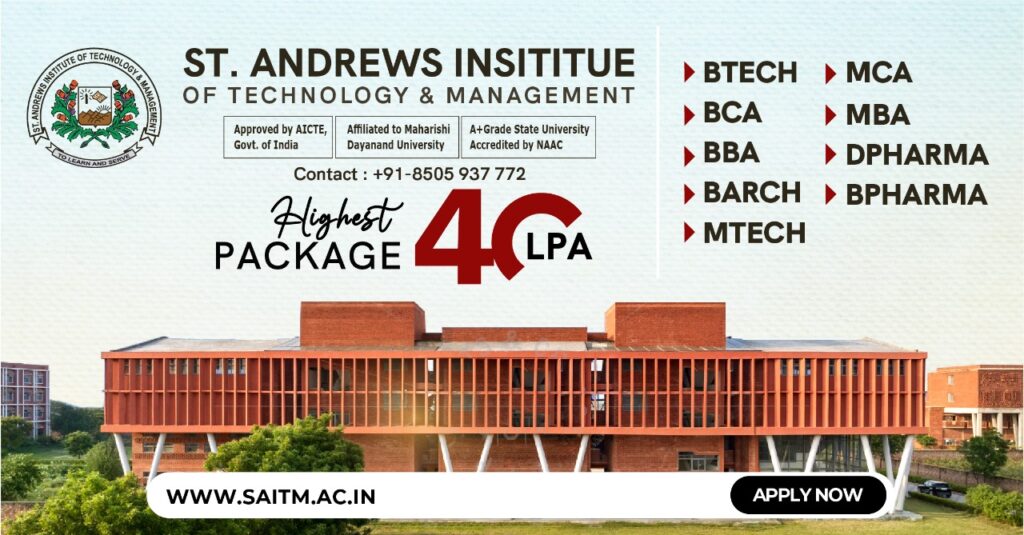MBA in Business Analytics

An MBA in Business Analytics is a specialized graduate-level degree program that focuses on the intersection of business administration and data analysis. It combines core business principles with advanced analytics techniques to help organizations make data-driven decisions and solve complex business problems.
Here’s a detailed breakdown of what you can expect from such a program:
Core Business Knowledge
Like any traditional MBA program, a Business Analytics MBA will cover fundamental business concepts such as finance, marketing, operations, strategy, and organizational behavior. This ensures that students have a strong foundation in business management and leadership skills.
Analytics Fundamentals
The program will delve into the basics of data analysis, statistics, and research methodologies. Students will learn how to collect, clean, and interpret data to extract meaningful insights that can inform business strategies.
Advanced Analytics Techniques
Building upon the fundamentals, students will be exposed to advanced analytical methods and tools used in the industry. This includes predictive modeling, machine learning, data mining, optimization techniques, and big data analytics. Hands-on experience with popular analytics software such as R, Python, SAS, or SQL is often an integral part of the curriculum.
Business Intelligence and Data Visualization
Understanding how to effectively communicate insights derived from data is crucial in a business context. Students will learn how to create compelling visualizations and dashboards using tools like Tableau, Power BI, or QlikView to facilitate decision-making processes.
Decision Support Systems
Business Analytics MBAs often cover the design and implementation of decision support systems that leverage data and analytics to assist managers in making strategic and operational decisions. This involves understanding the integration of analytics into business processes and the ethical considerations surrounding data usage and privacy.
Industry Applications and Case Studies
Real-world applications and case studies are integrated into the curriculum to provide students with practical insights into how analytics is used across various industries such as finance, healthcare, retail, marketing, and supply chain management. Guest lectures from industry practitioners and site visits to companies utilizing analytics may also be part of the program.
Electives and Specializations
Many programs offer elective courses or concentrations that allow students to tailor their studies to specific areas of interest within business analytics, such as healthcare analytics, financial analytics, marketing analytics, or supply chain analytics.
Capstone Projects or Internships
Students typically complete a capstone project or internship towards the end of the program, where they can apply their skills to solve a real-world business problem or work on a project for a company. This hands-on experience provides valuable practical experience and may also serve as a networking opportunity for future career prospects.
Soft Skills Development
In addition to technical skills, emphasis is often placed on developing soft skills such as critical thinking, communication, teamwork, and leadership, which are essential for success in the field of business analytics.
Networking Opportunities
Business Analytics MBA programs often provide ample networking opportunities through alumni networks, industry events, career fairs, and guest speakers, allowing students to connect with professionals in the field and explore career opportunities.
Some of the most opted courses in India and St. Andrews college or different Engineering college or Management colleges are as follows:-
- Btech
- Btech CSE
- Btech ETCE
- MTech
- BCA
- BBA
- MBA
- MCA
- DPharma – St. Andrews College of Pharmacy
- BPharma – St. Andrews College of Pharmacy
- BArch – St. Andrews College of Architecture
MBA Degree

An MBA, or Master of Business Administration degree, is a prestigious graduate-level degree program that provides individuals with a comprehensive understanding of business administration principles and practices. It is one of the most sought-after qualifications for professionals aspiring to advance their careers in various sectors of business, including finance, marketing, consulting, entrepreneurship, and more.
Here’s a detailed breakdown of what an MBA degree entails:
Core Business Knowledge:
MBA programs typically start with a foundation in core business disciplines such as finance, accounting, marketing, operations management, organizational behavior, and strategy. These courses provide students with a broad understanding of how businesses operate and the key principles that drive their success.
Leadership and Management Skills
Leadership development is a central focus of MBA programs. Students learn essential skills such as effective communication, decision-making, negotiation, conflict resolution, team management, and strategic thinking. Case studies, group projects, and experiential learning exercises are often used to develop these skills in a real-world context.
Specializations and Electives
MBA programs offer specializations or concentrations that allow students to tailor their studies to specific areas of interest or career goals. Common specializations include finance, marketing, entrepreneurship, consulting, operations management, healthcare management, and sustainability. Elective courses within these specializations deepen students’ knowledge in their chosen field.
Global Perspective
Given the increasingly interconnected nature of the business world, MBA programs often incorporate an international or global perspective. This may include courses on international business, cross-cultural management, global supply chain management, and international finance. Some programs also offer opportunities for international study tours or exchange programs to expose students to different business environments.
Experiential Learning Opportunities
MBA programs emphasize hands-on learning experiences to complement classroom instruction. These may include internships, consulting projects, business simulations, case competitions, and experiential learning trips. These opportunities provide students with practical experience, networking opportunities, and a chance to apply their skills in real-world settings.
Networking and Professional Development
MBA programs provide ample opportunities for networking with classmates, alumni, faculty, and industry professionals. Networking events, career fairs, guest lectures, and alumni connections help students build relationships and explore career opportunities. Career services offices often provide support with resume writing, interview preparation, and job search strategies.
Entrepreneurship and Innovation
Many MBA programs emphasize entrepreneurship and innovation, recognizing the importance of entrepreneurial thinking in today’s rapidly changing business landscape. Courses and experiential opportunities in entrepreneurship may cover topics such as business planning, venture capital, startup financing, innovation management, and new product development.
Ethical and Social Responsibility
MBA programs increasingly emphasize the importance of ethical leadership and corporate social responsibility. Courses may cover topics such as business ethics, sustainability, corporate governance, and social entrepreneurship, preparing students to navigate complex ethical dilemmas and contribute positively to society through their business endeavors.
Capstone Projects or Thesis
Some MBA programs require students to complete a capstone project or thesis, which allows them to apply their learning to a specific business challenge or research question. This culminating experience provides an opportunity for students to demonstrate their mastery of business concepts and analytical skills.
Flexibility and Diversity
MBA programs attract a diverse cohort of students with varied backgrounds, experiences, and career goals. This diversity enriches classroom discussions and fosters a dynamic learning environment. Many programs offer flexible scheduling options, including full-time, part-time, executive, and online formats, to accommodate the needs of working professionals.
Types of MBA Degree

MBA Degree comes in various formats and structures to cater to the diverse needs and preferences of students.
Here are some common types of MBA degrees:
Full-Time MBA Program
The Full-Time MBA degree is the traditional format wherein students enroll full-time for one to two years, dedicating themselves entirely to their studies. Full-time MBA program typically offers a comprehensive curriculum, experiential learning opportunities, and extensive networking opportunities.
Part-Time MBA
Part-time MBA programs cater to working professionals who want to earn an MBA without pausing their careers. These programs typically provide evening or weekend classes, enabling students to manage their education alongside work commitments. Generally, part-time MBAs take more time to complete compared to full-time programs.
Executive MBA (EMBA)
Executive MBA programs are tailored for mid-career professionals with significant work experience and managerial responsibilities. EMBA students typically continue working while attending classes on weekends, evenings, or in intensive sessions. These programs focus on advanced leadership skill, strategic thinking, and executive-level decision-making.
Online MBA
Online MBA degree offers flexibility for students who prefer to study remotely or have other commitments that prevent them from attending campus-based classes. These programs deliver course materials and lectures through online platforms, allowing students to complete coursework at their own pace. Online MBAs often include interactive components such as discussion forums, virtual group projects, and live webinars.
Dual Degree MBA Programs
Dual degree MBA programs allow students to earn an MBA along with another graduate degree, such as a Master of Science (MS), Master of Public Health (MPH), or Juris Doctor (JD). These programs provide interdisciplinary training and prepare students for specialized roles in fields such as healthcare, law, or technology.
Specialized MBA Programs
Specialized MBA degree focus on specific industries, functional areas, or career paths. Examples include MBA programs with concentrations in finance, marketing, entrepreneurship, healthcare management, sustainability, or technology management. These programs provide in-depth knowledge and skills tailored to particular sectors or roles.
Global MBA Programs
Global MBA degree incorporate international components such as study abroad opportunities, international internships, or coursework on global business topics. These programs aim to develop students’ understanding of global markets, cultures, and business practices, preparing them for careers in multinational corporations or international business roles.
Mini-MBA Programs
Mini-MBA programs are short, non-degree courses that provide an overview of MBA-level topics in a condensed format. These programs are often aimed at professionals who want to gain exposure to business fundamentals without committing to a full MBA program.
Admission Process MBA in Business Analytics

The admission process for an MBA in Business Analytics is similar to that of a traditional MBA program but may have specific requirements or considerations related to the analytics focus.
Here’s a breakdown of the typical admission process for an MBA in Business Analytics:

Research Programs
Start by researching MBA programs with a specialization or concentration in Business Analytics. Look for programs that offer a strong curriculum in analytics, data science, and business management, as well as resources such as specialized faculty, industry partnerships, and experiential learning opportunities.
Review Admission Requirements
For MBA Admissions with a Business Analytics focus, alongside standard requirements like a bachelor’s degree, test scores, transcripts, recommendations, and essays, programs may prioritize candidates with quantitative backgrounds in fields such as mathematics, statistics, engineering, computer science, or economics..
Prepare Application Materials
Gather all required application materials and prepare your application package. This may include transcripts, standardized test scores (such as the CAT or MAT), letters of recommendation, a resume or CV, essays or personal statements, and any additional materials specified by the program.
Highlight Relevant Experience and Skills
Emphasize any relevant experience, coursework, or skills related to analytics, data science, programming, and quantitative analysis in your application materials. Highlight your ability to apply analytical techniques to solve business problems and drive decision-making.
Demonstrate Interest and Fit
Tailor your application essays and statements to demonstrate your interest in Business Analytics and your fit with the program. Explain why you’re pursuing this specialization, how it aligns with your career goals, and what unique perspectives or experiences you bring to the table.
Prepare for Interviews (if applicable)
For MBA Admissions, certain programs may mandate interviews. If selected, prepare by delving into the program details, contemplating your enthusiasm for Business Analytics, and rehearsing typical interview queries.
Submit Applications
Complete and submit your applications by the program’s deadlines. Be sure to follow all instructions and submit all required materials, including transcripts, test scores, recommendation letters, and application fees.
Wait for Admission Decisions
After submitting your applications, you’ll need to wait for admission decisions from the programs you applied to. Admission decisions are typically communicated by email or postal mail and may include acceptance, waitlist status, or denial.
Evaluate Offers and Make a Decision
If you receive multiple offers of admission, carefully evaluate each program based on factors such as curriculum, faculty, resources, and fit with your goals and preferences. Once you’ve made your decision, accept the offer of admission and prepare for enrollment.
Complete Enrollment Process
After accepting an offer of admission, follow the instructions provided by the program to complete the enrollment process. This may include submitting enrollment deposits, registering for classes, attending orientation sessions, and fulfilling any pre-enrollment requirements.
Eligibility Criteria for MBA

The eligibility criteria for an MBA in Business Analytics can vary depending on the specific program and institution.
However, here are some common eligibility requirements you might encounter:
Bachelor’s Degree
Most MBA programs require applicants to hold a bachelor’s degree from an accredited institution. While the specific undergraduate major may vary, programs with a focus on Business Analytics may prefer applicants with a background in quantitative fields such as mathematics, statistics, engineering, computer science, economics, or business administration.
Work Experience (Optional)
While some MBA programs require applicants to have prior work experience, particularly Executive MBA programs, others may admit students directly from undergraduate programs. Programs with a Business Analytics focus may value work experience in roles related to analytics, data science, business intelligence, or quantitative analysis.
Standardized Test Scores
MBA programs require applicants to submit scores from standardized tests. However, some programs may waive this requirement or offer test-optional admission, especially for applicants with extensive work experience or academic achievements.
English Language Proficiency
International applicants whose native language is not English may need to demonstrate proficiency in English through standardized tests such as the TOEFL (Test of English as a Foreign Language) or the IELTS (International English Language Testing System), unless they have completed their undergraduate studies in an English-speaking country.
Letters of Recommendation
MBA programs typically require applicants to submit letters of recommendation from academic or professional references who can attest to their qualifications, character, and potential for success in graduate studies.
Statement of Purpose or Essays
Applicants may be required to submit a statement of purpose or essays that articulate their reasons for pursuing an MBA in Business Analytics, their career goals, and how the program aligns with their aspirations.
Interview (Optional)
Some MBA programs may require applicants to participate in an interview as part of the admissions process. The interview may be conducted in-person, via video conference, or over the phone, and aims to assess the applicant’s fit with the program and their potential for success.
Additional Requirements
Depending on the program, applicants may need to fulfill additional requirements such as completing prerequisite courses, submitting a resume or curriculum vitae (CV), participating in admissions events or workshops, or providing portfolios or samples of work (especially for applicants with experience in analytics-related roles).
Top MBA Entrance Exams in India for MBA

In India, several MBA entrance exams are widely recognized and accepted by top business schools offering MBA courses with specializations in Business Analytics.
Here are some of the top MBA entrance exams in India for pursuing an MBA in Business Analytics:
Common Admission Test (CAT)
CAT is one of the most prestigious MBA entrance exams in India, conducted annually by the Indian Institutes of Management (IIMs). Many other top-tier business schools also accept CAT scores for admission to their MBA programs. CAT assesses candidates’ quantitative, verbal, and logical reasoning skills and is widely used by institutions offering MBA programs in Business Analytics.
Xavier Aptitude Test (XAT)
XAT is conducted by XLRI Jamshedpur on behalf of the Xavier Association of Management Institutes (XAMI). It is accepted by several top-tier business schools in India, including XLRI, XIMB, and IMT Ghaziabad. XAT evaluates candidates’ aptitude in verbal and logical reasoning, quantitative ability, decision making, and general awareness.
Management Aptitude Test (MAT)
MAT is a national-level entrance exam conducted by the All India Management Association (AIMA) for admission to MBA programs offered by various management institutes across India. MAT assesses candidates’ aptitude in language comprehension, mathematical skills, data analysis, intelligence, and critical reasoning.
Common Management Admission Test (CMAT)
CMAT is a national-level entrance exam conducted by the National Testing Agency (NTA) for admission to MBA programs offered by AICTE-approved institutions in India. CMAT evaluates candidates’ quantitative techniques and data interpretation, language comprehension, logical reasoning, and general awareness.
Indian Institutes of Management Admission Test (IIM-AAT)
Some Indian Institutes of Management (IIMs) conduct their own admission tests for specific MBA programs. For example, IIM Bangalore offers the Analytics Admission Test (AAT) for admission to its MBA program in Business Analytics. AAT assesses candidates’ aptitude in mathematics, statistics, logical reasoning, and data interpretation.
Fees Structure of MBA in Business Analytics

The fee structure for an MBA in Business Analytics can vary significantly depending on factors such as the reputation of the institution, program duration, location, facilities offered, and whether the program is full-time, part-time, or online.
Here are some general considerations regarding the fee structure:
Tuition Fees
Tuition fees for MBA programs in Business Analytics can range from moderate to high, depending on the institution. Premier business schools or universities may have higher tuition fees compared to lesser-known institutions. The tuition fees typically cover the cost of academic instruction, access to resources such as libraries and databases, and sometimes include study materials or software licenses.
Additional Costs
In addition to tuition fees, students may incur additional costs such as registration fees, examination fees, administrative fees, and charges for study materials, textbooks, or software required for coursework. Some programs also include fees for activities, workshops, or study trips.
Scholarships and Financial Aid
Many institutions offer scholarships, grants, or financial aid to eligible students to help offset the cost of tuition. Scholarships may be based on academic merit, financial need, diversity, or other criteria. Students are encouraged to explore scholarship opportunities and apply for financial aid to reduce their out-of-pocket expenses.
Living Expenses
Students pursuing an MBA in Business Analytics may need to consider living expenses such as accommodation, meals, transportation, utilities, and personal expenses. The cost of living can vary depending on factors such as the city or region where the institution is located and the student’s lifestyle choices.
Opportunity Costs
Full-time MBA programs often require students to temporarily leave the workforce, which means foregoing potential income during the program duration. Part-time or online MBA programs may allow students to continue working while studying, reducing the opportunity costs associated with lost income.
Financial Planning
It’s essential for prospective students to carefully consider the overall cost of pursuing an MBA in Business Analytics and develop a financial plan to cover tuition fees, living expenses, and other costs associated with the program. This may involve exploring loan options, savings, income sources, or employer sponsorship.
Fee Structure Details
For specific information on the fee structure of MBA programs in Business Analytics, prospective students should directly contact the admissions offices of institutions they are interested in or visit the institution’s official website. Admissions staff can provide detailed information on tuition fees, payment schedules, financial aid options, and any additional costs associated with the program.
Benifits of Pursuing MBA in Business Analytics
Pursuing an MBA in Business Analytics offers numerous benefits, both in terms of personal and professional development, as well as career advancement opportunities.
Here are some of the key benefits:
In-Demand Skills
Business analytics skills are highly sought after in today’s data-driven business environment. By obtaining this course you acquire a valuable skill set that includes data analysis, predictive modeling, machine learning, and data visualization, which are in high demand across various industries.
Career Opportunities
Business analytics professionals are in high demand across industries such as finance, healthcare, marketing, consulting, retail, and technology. With an MBA in Business Analytics, you can pursue a wide range of roles, including business analyst, data scientist, marketing analyst, financial analyst, operations analyst, and more.
Strategic Decision-Making
Business analytics skills enable you to make data-driven decisions and derive actionable insights from complex datasets. This ability to analyze data and extract meaningful insights empowers you to make informed decisions that drive business growth, improve operational efficiency, and enhance competitiveness.
Competitive Advantage
In today’s competitive job market, having an MBA in Business Analytics sets you apart from other candidates. Employers value candidates who possess a combination of business acumen and analytical skills, making you a highly desirable candidate for roles that require both managerial and technical expertise.
Higher Earning Potential
Business analytics professionals command higher salaries due to the specialized skills and expertise they bring to organizations. According to industry reports, professionals with business analytics skills often earn higher salaries compared to their counterparts without such skills.
Flexibility and Versatility
An MBA in Business Analytics provides you with a versatile skill set that can be applied across various industries and functions. Whether you’re interested in finance, marketing, operations, or consulting, business analytics skills are transferable and can be adapted to different roles and responsibilities.
Opportunities for Innovation
Business analytics enables organizations to innovate and gain a competitive edge by leveraging data to identify market trends, customer preferences, and business opportunities. With an MBA in Business Analytics, you can drive innovation within organizations by applying advanced analytics techniques to solve complex business problems and uncover new insights.
Networking Opportunities:
Top MBA programs provide ample opportunities for networking with classmates, alumni, faculty, and working professionals. Networking events, guest lectures, and industry conferences allow you to connect with professionals in the field and explore career opportunities, partnerships, and collaborations.
Career Advancement
Business analytics skills are essential for career advancement in today’s business landscape. With an MBA in Business Analytics, you can advance to leadership roles such as business analytics manager, director of analytics, or chief data officer, where you can lead analytics initiatives, drive strategic decision-making, and shape the future direction of organizations.
Personal Growth and Development
Pursuing an MBA in Business Analytics is not just about acquiring technical skills; it’s also about personal growth and development. You’ll enhance your critical thinking, problem-solving, communication, and leadership skills, which are valuable assets that will benefit you throughout your career.
Syllabus of MBA in Business Analytics

Here’s a detailed breakdown of a typical MBA in Business Analytics syllabus:

Foundation Courses:
Introduction to Business Analytics: Overview of the field of business analytics, its importance, and applications in various industries.
Quantitative Methods for Business: Review of basic statistical concepts and techniques commonly used in business analytics, such as probability theory, hypothesis testing, regression analysis, and forecasting.
Core Business Courses:
Financial Accounting: Understanding financial statements, financial management and analysis.
Managerial Accounting: Cost accounting, budgeting, and decision-making techniques.
Marketing Management: Principles of marketing strategy, market analysis, and consumer behavior.
Operations Management: Optimization of business processes, supply chain management, and quality control.
Strategic Management: Formulation and implementation of business strategies, competitive analysis, and strategic planning.
Advanced Analytics Courses:
Data Mining and Machine Learning: Techniques for extracting insights and patterns from large datasets, including clustering, classification, regression, and association rule mining.
Predictive Analytics: Methods for predicting future outcomes and trends based on historical data, including time series analysis and predictive modeling.
Big Data Analytics: Tools and technologies for processing, storing, and analyzing large volumes of data, including Hadoop, Spark, and NoSQL databases.
Text Analytics and Natural Language Processing (NLP): Analysis of unstructured text data for sentiment analysis, topic modeling, and text classification.
Prescriptive Analytics: Optimization techniques for decision-making, such as linear programming, integer programming, and dynamic programming.
Business Intelligence and Data Visualization:
Data Warehousing and Business Intelligence: Design and implementation of data warehouses and business intelligence systems for reporting and analysis.
Data Visualization: Techniques for creating effective visualizations and dashboards to communicate insights to stakeholders, using tools like Tableau, Power BI, or QlikView.
Elective Courses and Specializations:
Marketing Analytics: Analysis of marketing campaigns, customer segmentation, and customer lifetime value.
Financial Analytics: Risk management, portfolio analysis, and financial management.
Healthcare Analytics: Analysis of healthcare data for improving patient outcomes, cost reduction, and fraud detection.
Supply Chain Analytics: Optimization of supply chain processes, inventory management, and logistics.
Social Media Analytics: Analysis of social media data for brand sentiment analysis, customer engagement, and influencer marketing.
Case Studies and Practical Applications:
Application of analytical techniques to real-world business problems through case studies, group projects, and simulations.
Guest lectures and industry speakers sharing insights and best practices from their experiences in implementing business analytics solutions.
Capstone Project or Thesis:
Culminating project where students apply their knowledge and skills to solve a business problem or conduct original research in the field of business analytics.
Often involves working with a company or organization to analyze data and provide actionable insights or recommendations.
Soft Skills Development:
Emphasis on communication, teamwork, and leadership skills through group projects, presentations, and teamwork exercises.
Development of critical thinking and problem-solving abilities in the context of business analytics challenges.
Ethical and Legal Considerations:
Discussion of ethical issues related to data privacy, security, and responsible use of data in business analytics.
Compliance with regulations such as GDPR (General Data Protection Regulation) and HIPAA (Health Insurance Portability and Accountability Act) in handling sensitive data.
Industry Seminars and Networking Events:
Opportunities for students to engage with industry professionals through seminars, workshops, and networking events.
Exposure to current trends, emerging technologies, and career opportunities in the field of business analytics.
Top Colleges for MBA in Business Analytics

In India, there are several prestigious institutions that offer MBA programs with specializations or concentrations in Business Analytics.
Here are some of the top business school for MBA in Business Analytics in India:
Indian Institute of Management Bangalore (IIMB)
IIM Bangalore offers an MBA program with a specialization in Business Analytics. The program focuses on teaching students how to apply analytical tools and techniques to solve business problems effectively.
Indian Institute of Management Calcutta (IIMC)
IIM Calcutta offers an MBA program with a specialization in Business Analytics. The program is designed to equip students with the knowledge and skills required to analyze large datasets and derive actionable insights for decision-making.
Indian Institute of Management Ahmedabad (IIMA)
IIM Ahmedabad offers an MBA program with a focus on Business Analytics and Decision Sciences. The program emphasizes the use of analytics to drive strategic decision-making and improve organizational performance.
Indian Institute of Technology Delhi (IIT Delhi)
IIT Delhi offers an MBA program with a specialization in Information Systems Management, which covers topics related to Business Analytics, Big Data, and Data Science.
Indian Institute of Technology Kharagpur (IIT Kharagpur)
IIT Kharagpur offers an MBA program with a specialization in Business Analytics and Systems. The program combines business administration principles with advanced analytics techniques to prepare students for roles in analytics-driven organizations.
Indian Institute of Technology Madras (IIT Madras)
IIT Madras offers an MBA program with a specialization in Business Analytics. The program focuses on developing students’ analytical skills and business acumen to tackle complex business challenges.
Indian Institute of Technology Bombay (IIT Bombay)
IIT Bombay offers an MBA program with a concentration in Business Analytics and Information Management. The program covers topics such as data mining, predictive modeling, and business intelligence.
Department of Management Studies, Indian Institute of Science (IISc) Bangalore
IISc Bangalore offers an MBA program with a specialization in Business Analytics. The program aims to train students in using data-driven insights to make informed business decisions.
St. Andrews Institute of Technology & Management (SAITM)

St. Andrews Institute of Technology & Management (SAITM) is an educational institution that offers an MBA Degree with a specialization in Business Analytics, aimed at equipping students with the skills and knowledge required to thrive in today’s data-driven business environment. The MBA in Business Analytics program at SAITM combines core business management principles with advanced analytics techniques to prepare students for roles where data analysis and interpretation are crucial for decision-making.
Jobs Profiles after MBA in Business Analytics

After completing an MBA in Business Analytics in India, graduates can pursue a variety of job profiles across industries that require expertise in data analysis, interpretation, and strategic decision-making.
Here are some common job profiles:
Data Analyst
Data analysts are responsible for collecting, processing, and analyzing large datasets to extract actionable insights and trends. They utilize statistical methods, data mining techniques, and visualization tools to support business decision-making across various functions such as marketing, finance, operations, and human resources.
Business Intelligence Analyst
Business intelligence analysts focus on transforming raw data into meaningful information to support strategic planning and decision-making. They design and develop dashboards, reports, and data visualization tools to communicate insights and trends to stakeholders, enabling informed business decisions.
Data Scientist
Data scientists use advanced analytics techniques such as machine learning, predictive modeling, and artificial intelligence to analyze complex datasets and develop predictive algorithms. They apply statistical methods and programming skills to solve business problems, optimize processes, and uncover opportunities for innovation.
Marketing Analyst
Marketing analysts analyze market trends, consumer behavior, and marketing campaign performance to inform marketing strategies and initiatives. They utilize data analytics tools and techniques to segment customers, measure campaign effectiveness, and optimize marketing ROI.
Operations Analyst
Operations analysts focus on optimizing business processes, supply chain operations, and resource allocation using data-driven approaches. They identify inefficiencies, streamline workflows, and improve operational efficiency to enhance productivity and profitability.
Financial Analyst
Financial analysts analyze financial data, market trends, and investment opportunities to support financial decision-making. They evaluate company performance, assess investment risks, and provide recommendations for strategic investments, budgeting, and forecasting.
Consultant (Business Analytics)
Business analytics consultants work with organizations to assess their data analytics needs, develop strategies, and implement solutions that leverage data to drive business value. They provide expertise in areas such as data strategy, analytics implementation, and change management to help clients achieve their business objectives.
Product Manager
Product managers use data analytics to understand customer needs, prioritize product features, and guide product development efforts. They analyze user data, conduct market research, and collaborate with cross-functional teams to drive product innovation and improve user experience.
Supply Chain Analyst
Supply chain analysts analyze supply chain data to optimize inventory management, logistics operations, and supplier relationships. They use data analytics tools and techniques to identify cost-saving opportunities, minimize supply chain disruptions, and improve overall efficiency.
Risk Analyst
Risk analysts assess financial, operational, and market risks facing organizations and develop strategies to mitigate risks and protect assets. They analyze data to identify potential risks, model scenarios, and recommend risk management strategies to safeguard against adverse events.
MBA in Business Analytics Top Recruiters

Several prominent companies across various industries actively hire MBA graduates with expertise in Business Analytics in India. These companies recognize the value of data-driven decision-making and seek candidates who can leverage analytics to drive strategic initiatives and optimize business performance.
Here are some of the top corporate recruiters for MBA graduates in Business Analytics in India:
IT and Technology Companies:
Microsoft
Amazon
IBM
Accenture
Infosys
Tata Consultancy Services (TCS)
Cognizant
Finance and Banking Institutions:
Goldman Sachs
J.P. Morgan
Morgan Stanley
HDFC Bank
ICICI Bank
Axis Bank
State Bank of India (SBI)
Consulting Firms:
McKinsey & Company
Boston Consulting Group (BCG)
Bain & Company
Deloitte
PricewaterhouseCoopers (PwC)
KPMG
EY (Ernst & Young)
Accenture Strategy
E-commerce and Retail Companies:
Flipkart
Amazon India
Walmart India
Reliance Retail
Future Group
Myntra
Snapdeal
Paytm Mall
FMCG (Fast Moving Consumer Goods) Companies:
Hindustan Unilever Limited (HUL)
Procter & Gamble (P&G)
Nestlé India
ITC Limited
Coca-Cola India
PepsiCo India
Britannia Industries
Telecommunication Companies:
Bharti Airtel
Vodafone Idea Limited
Reliance Jio
Tata Communications
Idea Cellular (Aditya Birla Group)
Healthcare and Pharmaceutical Companies:
Apollo Hospitals
Fortis Healthcare
Cipla
Dr. Reddy’s Laboratories
Sun Pharmaceutical Industries
Abbott India
Pfizer India
Automobile Companies:
Maruti Suzuki India Limited
Tata Motors
Mahindra & Mahindra
Hyundai Motor India
Honda Cars India
Ford India
Salary after MBA in Business Analytics
Sure, here’s a more detailed breakdown of the salary potential after completing an MBA in Business Analytics in India:
Entry-Level Positions (0-2 years of experience):
Fresh MBA graduates in Business Analytics can expect to earn salaries ranging from ₹6 lakhs to ₹12 lakhs per annum, depending on factors such as the institution’s reputation, location, and industry demand.
Entry-level roles may include positions such as Data Analyst, Business Analyst, or Junior Consultant in industries such as IT, consulting, finance, e-commerce, and healthcare.
Mid-Level Positions (3-5 years of experience):
Professionals with 3-5 years of experience in Business Analytics can command salaries ranging from ₹10 lakhs to ₹20 lakhs per annum.
Mid-level roles may include positions such as Senior Data Analyst, Business Intelligence Analyst, Analytics Manager, or Consultant, with increased responsibilities and leadership opportunities.
Senior-Level Positions (5+ years of experience):
Senior-level professionals with 5 or more years of experience in Business Analytics can earn salaries upwards of ₹20 lakhs per annum or more, depending on their expertise, leadership skill, and industry demand.
Senior roles may include positions such as Data Scientist, Senior Analytics Manager, Analytics Director, or Head of Analytics, with strategic responsibilities and a focus on driving business growth and innovation.
Top-tier Organizations and Industries:
MBA graduates in Business Analytics who secure positions in top-tier organizations, multinational companies, or high-growth industries such as IT, consulting, finance, e-commerce, and healthcare may command higher salaries compared to average market rates.
Salaries can vary significantly based on factors such as company size, location (metro cities typically offer higher salaries), job role, and negotiation skills.
Additional Factors Impacting Salary:
Apart from experience and industry demand, other factors such as academic background, technical skills (e.g., proficiency in programming languages, data visualization tools), certifications (e.g., SAS, R, Python), and soft skills (e.g., communication, leadership) can also influence salary levels.
Professionals with advanced technical skills, specialized expertise in areas such as machine learning, artificial intelligence, or big data, or industry-specific knowledge may command even higher salaries.
FAQs
What is MBA in Business Analytics?
MBA in Business Analytics is a specialized program that combines business administration principles with advanced analytics techniques to prepare students for roles at the intersection of business and data science. It equips students with skills in data analysis, interpretation, and strategic decision-making.
What are the eligibility criteria for MBA in Business Analytics?
Eligibility criteria may vary depending on the institution, but typically include a bachelor’s degree in any discipline from a recognized university, a minimum GPA or percentage requirement, and qualifying scores in entrance exams such as CAT, MAT, or CMAT.
What is the duration of MBA in Business Analytics?
The duration of MBA in Business Analytics programs is typically 2 years for full-time programs. Part-time or executive MBA programs may have a different duration.
What is the curriculum like for MBA in Business Analytics?
The curriculum covers a wide range of topics including statistics, data mining, machine learning, predictive modeling, data visualization, business intelligence, supply chain management, and strategic management. MBA Students also often undertake practical projects and internships.
What career opportunities are available after completing an MBA in Business Analytics?
Graduates can pursue diverse roles such as data analyst, business intelligence analyst, data scientist, marketing analyst, operations analyst, consultant, and more in industries such as IT, consulting, finance, healthcare, retail, and e-commerce.
What is the salary potential for MBA graduates in Business Analytics?
Salary potential varies based on factors such as experience, industry, location, and job role. However, MBA graduates in Business Analytics often command competitive salaries due to the high demand for their skills.
Is MBA Program with specialization of Business Analytics worth it?
Yes, an MBA program with a specialization in Business Analytics is worth it. It equips MBA students with a blend of business administration and advanced analytics skills, preparing them for high-demand roles at the intersection of business and data science. With the increasing importance of data-driven decision-making in organizations, professionals with expertise in business analytics are highly sought after. Graduates of such programs have access to diverse career opportunities and command competitive salaries. Additionally, they can contribute to driving innovation, optimizing processes, and achieving strategic goals within their organizations, making the investment in this specialized MBA program valuable.
What are various MBA Programs?
Various MBA programs include Full-Time, Part-Time, Executive, Online, Dual, and Specialized programs like Finance, Marketing, Entrepreneurship, Healthcare Management, Operations Management, Information Technology Management, International Business, and Sustainability. Each offers unique features to meet specific career goals and interests.
Are there any specific certifications or additional courses recommended for MBA in Business Analytics students?
While not mandatory, certifications in analytics tools such as SAS, R, Python, or specialized courses in machine learning, big data, or business intelligence can enhance the skillset and marketability of MBA graduates in Business Analytics.
What are the top business school offering MBA in Business Analytics in India?
Some top business school offering MBA in Business Analytics in India include Indian School of Business (ISB), Indian Institute of Management (IIM) Bangalore, IIM Calcutta, XLRI Jamshedpur, SP Jain Institute of Management and Research (SPJIMR), and more.
Is work experience required for MBA in Business Analytics?
Work experience requirements may vary depending on the institution and program. Some programs may prefer candidates with prior work experience, while others may admit fresh graduates.
What is the average package for MBA in business analytics?
The average package for MBA graduates in Business Analytics varies depending on factors such as the institution, location, industry, and level of experience. However, in India, fresh graduates can expect starting salaries ranging from ₹6 lakhs to ₹12 lakhs per annum. With a few years of experience, mid-level professionals may earn between ₹10 lakhs to ₹20 lakhs per annum, while senior-level professionals can command upwards of ₹20 lakhs per annum. Salaries may be higher in industries such as IT, consulting, finance, and e-commerce, where data analytics skills are highly valued, making MBA in Business Analytics a lucrative investment for career growth.
How can I apply for MBA in Business Analytics?
The application process typically involves filling out an online application form, submitting required documents such as academic transcripts, letters of recommendation, and statement of purpose, and appearing for entrance exams and interviews as required by the institution.





